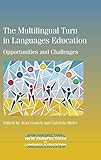TheMultilingual Turn in Languages Education : Opportunities and Challenges / ed. by Jean Conteh, Gabriela Meier.
Material type: TextSeries: New Perspectives on Language and EducationPublisher: Bristol ; Blue Ridge Summit : Multilingual Matters, [2014]Copyright date: ©2014Description: 1 online resource (320 p.)Content type:
TextSeries: New Perspectives on Language and EducationPublisher: Bristol ; Blue Ridge Summit : Multilingual Matters, [2014]Copyright date: ©2014Description: 1 online resource (320 p.)Content type: - 9781783092239
- 9781783092246
- Education, Bilingual
- Language and languages -- Study and teaching
- Multicultural education
- Multilingualism -- Social aspects
- LANGUAGE ARTS & DISCIPLINES / Linguistics / General
- language and society
- language education
- multilingual classrooms
- multilingual curricula
- multilingual practices
- multilingual society
- multilingual turn
- 418.007 23
- P53.45 .M85 2014
- P53.45 .M85 2014
- online - DeGruyter
- Issued also in print.
| Item type | Current library | Call number | URL | Status | Notes | Barcode | |
|---|---|---|---|---|---|---|---|
 eBook
eBook
|
Biblioteca "Angelicum" Pont. Univ. S.Tommaso d'Aquino Nuvola online | online - DeGruyter (Browse shelf(Opens below)) | Online access | Not for loan (Accesso limitato) | Accesso per gli utenti autorizzati / Access for authorized users | (dgr)9781783092246 |
Browsing Biblioteca "Angelicum" Pont. Univ. S.Tommaso d'Aquino shelves, Shelving location: Nuvola online Close shelf browser (Hides shelf browser)

|

|

|

|

|

|

|
||
| online - DeGruyter Studies in Second Language Acquisition of Chinese / | online - DeGruyter Young Children as Intercultural Mediators : Mandarin-speaking Chinese Families in Britain / | online - DeGruyter Migrant Communication Enterprises : Regimentation and Resistance / | online - DeGruyter TheMultilingual Turn in Languages Education : Opportunities and Challenges / | online - DeGruyter Measuring L2 Proficiency : Perspectives from SLA / | online - DeGruyter TheImpact of Self-Concept on Language Learning / | online - DeGruyter TheBilingual Advantage : Language, Literacy and the US Labor Market / |
Frontmatter -- Contents -- Contributors -- Acknowledgments -- Foreword -- Introduction -- Part 1 -- Societal Perspectives on the Multilingual Turn in Language(s) Education -- 1. Socialized into Multilingualism: A Case Study of a Mauritian Pre-school -- 2. Exploring the -lingual Between Bi and Mono: Young People and Their Languages in an Australian Context -- 3. Multilingualism as Portrayed in a Chinese English Textbook -- 4. Looking Through the Language Lens: Monolingual Taint or Plurilingual Tint? -- Part 2 -- Perspectives on the Multilingual Turn in Education -- 5. From Normalization to Didactization of Multilingualism: European and Francophone Research at the Crossroads Between Linguistics and Didactics -- 6. Our Mother Tongue is Plurilingualism: A Framework of Orientations for Integrated Multilingual Curricula -- 7. Multilingual Teachers' Resources in Three Different Contexts: Empowering Learning -- 8. Multilingualism and Social Cohesion: Two-way Immersion Education Meets Diverse Needs -- Part 3 -- Visions of the Multilingual Turn in Pedagogy and Practice -- 9. Multilingual Pedagogy in Primary Settings: From the Margins to the Mainstream -- 10. Plurilingualism and Empathy: Beyond Instrumental Language Learning -- 11. Translanguaging as Process and Pedagogy: Developing the English Writing of Japanese Students in the US -- 12. Transforming Learning, Building Identities: Arts-based Creativity in the Community Languages Classroom -- Conclusion: The Multilingual Turn in Languages Education -- Author Index -- Subject Index
restricted access online access with authorization star
http://purl.org/coar/access_right/c_16ec
Starting from the key idea that learners and teachers bring diverse linguistic knowledge and resources to education, this book establishes and explores the concept of the 'multilingual turn' in languages education and the potential benefits for individuals and societies. It takes account of recent research, policy and practice in the fields of bilingual and multilingual education as well as foreign and second language education. The chapters integrate theory and practice, bringing together researchers and practitioners from five continents to illustrate the effects of the multilingual turn in society and evaluate the opportunities and challenges of implementing multilingual curricula and activities in a variety of classrooms. Based on the examples featured, the editors invite students, teachers, teacher educators and researchers to reflect on their own work and to evaluate the relevance and applicability of the multilingual turn in their own contexts.
Issued also in print.
Mode of access: Internet via World Wide Web.
In English.
Description based on online resource; title from PDF title page (publisher's Web site, viewed 24. Apr 2022)


